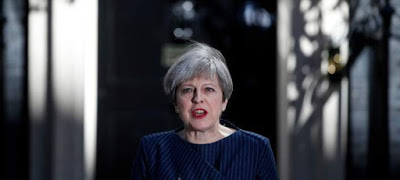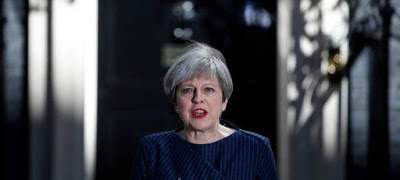The election result will help unify parliament behind its Brexit plan and avoid instability, says British PM
With an overwhelming majority, the House of Commons approved the request of the British Prime Minister Theresa May for early parliamentary elections on June 8. The proposal was approved by 522 votes to 13. In order for the Prime Minister's proposal to pass, he needed the support of two thirds of the 650 members of Parliament.
Earlier, Theresa May called on parliament to support calling early national elections, saying the election result would help unify parliament behind its Brexit plan and avoid instability.
"I believe that at this moment of great national importance, there should be unity here in Westminster, not discord," May told lawmakers. "For this reason, the right and responsible thing we all need to do here today is to vote in favor of holding general elections," he said.
Elections and then Brexit
On the part of the European Union, as the discussions on Brexit will be delayed due to the early elections, the President of the European Commission Jean-Claude Juncker expressed the view that the "real negotiations" between the European Union and the United Kingdom for the exit of Britain from the EU will begin after the June 8th snap elections.
Commission spokeswoman Margaritis Schoinas said yesterday that Jean-Claude Juncker and the British Prime Minister had a telephone conversation on Tuesday night, following the announcement by Downing Street of the intention to hold early elections.
"After the talks, the President considers that the actual political negotiations on Article 50 with the United Kingdom will begin after the elections scheduled for June 8," the spokesman said, adding that for the European Commission, the British elections do not change timetable. "In any case, the negotiations were to start in June," said Margaritis Schoinas.
The program
According to the program drawn up by the Commission, the Commission will present its "proposal" to the Member States in early May on the mandate of the EU negotiators, headed by Michel Barnier. The proposal would then have to be formally adopted on 22 May by the 27 foreign ministers in the General Affairs Council, at the same time as the 27 directives on negotiations with the United Kingdom.
These "guidelines" will be more detailed than the "guidelines" of the negotiations already proposed by European Council President Donald Tusk, which will be adopted during the European Summit on 29 April in Brussels. The representative of the Commission ruled out the possibility of London having a say in the fate of the two European agencies currently based in the UK, the European Banking Authority (EBA) and the European Medicines Agency (EMA).
"The services of the European Union must be based in the territory of the European Union. "The decision on the EBA and the EMA is not part of the Brexit negotiations, it is a consequence of Brexit," said Margaritis Schoinas. "The United Kingdom has no say in this transfer of headquarters," he concluded.
The request and the 180 degree turn
It is recalled that Theresa May called for early parliamentary elections on June 8. Her decision to call early elections, however, is tantamount to a 180-degree turn from what she had previously said, as she had repeatedly stated that she had ruled out such a possibility.
She had also said that Britain needed stability despite a new election, but today hinted that the division in Westminster was already working subversively for that stability. "Unity of great national importance should prevail here in Westminster at the moment, but instead there is division," May said yesterday as she announced the early general election.
She cited economic growth as a sign of her government's success. "Despite the predictions about the immediate risk in the financial and economic sector, after the referendum we saw consumer confidence remain high, a record number of jobs and economic growth that exceeded all expectations," she said. Economists point out that the relative "robustness" of the British economy now makes it suitable for early elections.
Influenced by polls
In addition, the attitude of the British Prime Minister may have been influenced by the polls. An ICM poll released Tuesday gives the Conservatives an 18-point lead over Labor, while other polls last week put the ruling party ahead by more than 20 percent.
The Labor Party, after all, is deeply divided over the aftermath of the Brexit referendum but also over the leadership of its leader, Jeremy Corbyn, who believes it will have to fight hard to win the election. The bookmakers already predict that the May Conservatives have an 80% chance of gaining a majority in the new House, while the Labor Party has only a 2% chance.
What does her eventual victory mean?
It is worth noting, however, that if May wins the June 8 election, her position will be strengthened in her homeland and in negotiations with the 27 EU member states. By securing a large majority, the British Prime Minister will be less obliged to the extreme Eurosceptics within her party, while the election of a new Prime Minister of the country will strengthen her personally, as well as her role.
It will also give it more space inside Britain to negotiate the terms of Brexit, which, according to the current timetable, will take place in March 2019. If it waited until 2020 to hold elections, it would have to face them. voters just one year after leaving the EU.
Announcing the election in June, Theresa May will ensure greater comfort within Britain, as new elections are not expected to take place until 2022. This would give her the space she needs to deal with the potential negative economic impact. of Brexit.
However, taking this risk also means that the three largest economies of the European Union (Germany, Britain and France) will hold elections in 2017.
Source: SigmaLive

